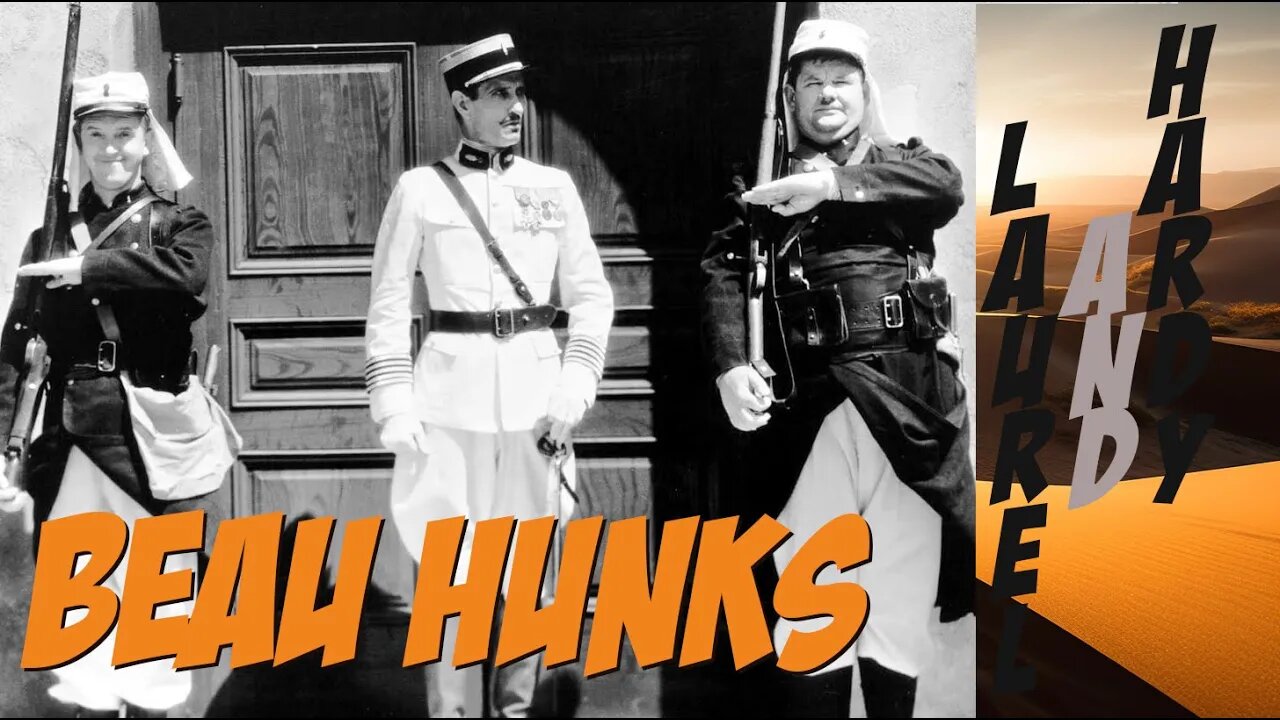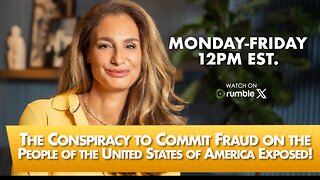Premium Only Content

Beau Hunks 🌵🐪 Laurel and Hardy 👬💔
"Beau Hunks" is a 1931 American pre-Code comedy film directed by James W. Horne and produced by Hal Roach.
It stars the legendary comedy duo Stan Laurel and Oliver Hardy, popularly known as Laurel and Hardy. The film is an adaptation of the 1927 novel "Beau Geste" by P.C. Wren and serves as a parody of the various adaptations of the novel, particularly the 1931 film "Beau Geste." The plot revolves around the duo joining the French Foreign Legion to forget a woman, only to discover that she has numerous identical sisters.
The film starts with Oliver Hardy heartbroken over a woman named Jeanie-Weenie, who has left him for another man. In an attempt to forget her, Hardy and his best friend, Stan Laurel, decide to join the French Foreign Legion. Once enlisted, they are sent to a remote desert outpost under the command of the strict Sergeant Hippo, who relentlessly drills them. Throughout the film, Laurel and Hardy's comedic mishaps and inability to follow orders lead to humorous misadventures and near-disasters.
"Beau Hunks" has been well-received by both audiences and critics. The film showcases Laurel and Hardy's impeccable comedic timing and ability to create laughter out of even the most ordinary situations. Additionally, the film effectively parodies the romanticized notion of the French Foreign Legion often portrayed in literature and film, providing a lighter, more humorous perspective on the military organization. The film remains a classic example of early 20th-century comedy and is a testament to the lasting impact of Laurel and Hardy's humor on the genre.
Trivia:
Initially intended to be a two-reeler, producer Hal Roach expanded the comedy in this film, ultimately financing it at twice its proposed length. The title "Beau Hunks" is a play on the term "Bohunk," which combined "Bohemian" and "Hungarian" and was a pejorative term for a person, typically male, at the time. The title also references the 1924 novel "Beau Geste," which was adapted into a film in 1926.
The film's director, James W. Horne, appears as the chief of the Riff Raff under the pseudonym Abul Kasim K'Horne. The film's credits humorously list an excessive number of supporting cast members, including "3897 Arabs, 1921 Riffians, and four native Swede guides." Jean Harlow, who had played minor roles in three previous Laurel and Hardy films, agreed to let the filmmakers use her photo as Jeannie Weenie, who drives the film's plot without physically appearing.
Marvin Hatley, the composer and head of Hal Roach's music department, filled out the film's ranks of the "ruffians." He also wrote "The Cuckoo Song," which became Laurel and Hardy's theme. Though Roach intended this four-reeler to compete with double features in theaters, it was too short for shorts and features, making it the only Laurel and Hardy comedy produced at this length. At 37 minutes, it is their most extended "short." Interestingly, the barracks set was reused for the 1935 film "Bonnie Scotland," Hal Roach later named this film his favorite of all he had made when he appeared on The Tonight Show Starring Johnny Carson in 1992 at the age of 100.
-
 LIVE
LIVE
Steven Crowder
3 hours ago🔴 BREAKING: Court Rules Trump Tariffs Illegal - Threatens to Destroy US National Security
26,827 watching -
 LIVE
LIVE
The Mel K Show
2 hours agoMORNINGS WITH MEL K - The Conspiracy to Commit Fraud on the People of the United States of America Exposed, Time to Face the Truth of Our Betrayal 5-29-25
1,123 watching -
 LIVE
LIVE
Due Dissidence
2 hours agoPiers Morgan DISMANTLES Israeli Ambassador, Elon OUT at DOGE, Gaza Dr's DEVASTATING UN Testimony
522 watching -
 LIVE
LIVE
Side Scrollers Podcast
1 hour agoPlayStation SOCIAL CREDIT SCORE + EA NUKES Black Panther Game + More | Side Scrollers LIVE
464 watching -
 LIVE
LIVE
The Dana Show with Dana Loesch
36 minutes agoFEDERAL COURT BLOCKS SEVERAL TRUMP TARIFFS | The Dana Show LIVE on Rumble!
335 watching -
 LIVE
LIVE
Blockchain Basement
29 minutes agoBitcoin MEGA Pump Incoming! (Drew Lost It ALL!)
56 watching -
 42:39
42:39
The Rubin Report
2 hours agoElon Musk Shocks Host w/ His Brutally Honest Answer That Will Offend Trump
14.5K14 -
 1:57:28
1:57:28
Benny Johnson
2 hours ago🚨 Bongino RIPS Open FBI Docs To RIG Election Against Trump ‘Hidden’ in FBI | Releases Epstein VIDEO
25.9K62 -
 1:01:19
1:01:19
VINCE
4 hours agoBongino Closes In On The J6 Pipebomber & A Secret Epstein Video | Episode 53 - 05/29/25
198K131 -
 LIVE
LIVE
LFA TV
13 hours agoLFA TV LIVE STREAM - THURSDAY 5/29/25
7,662 watching